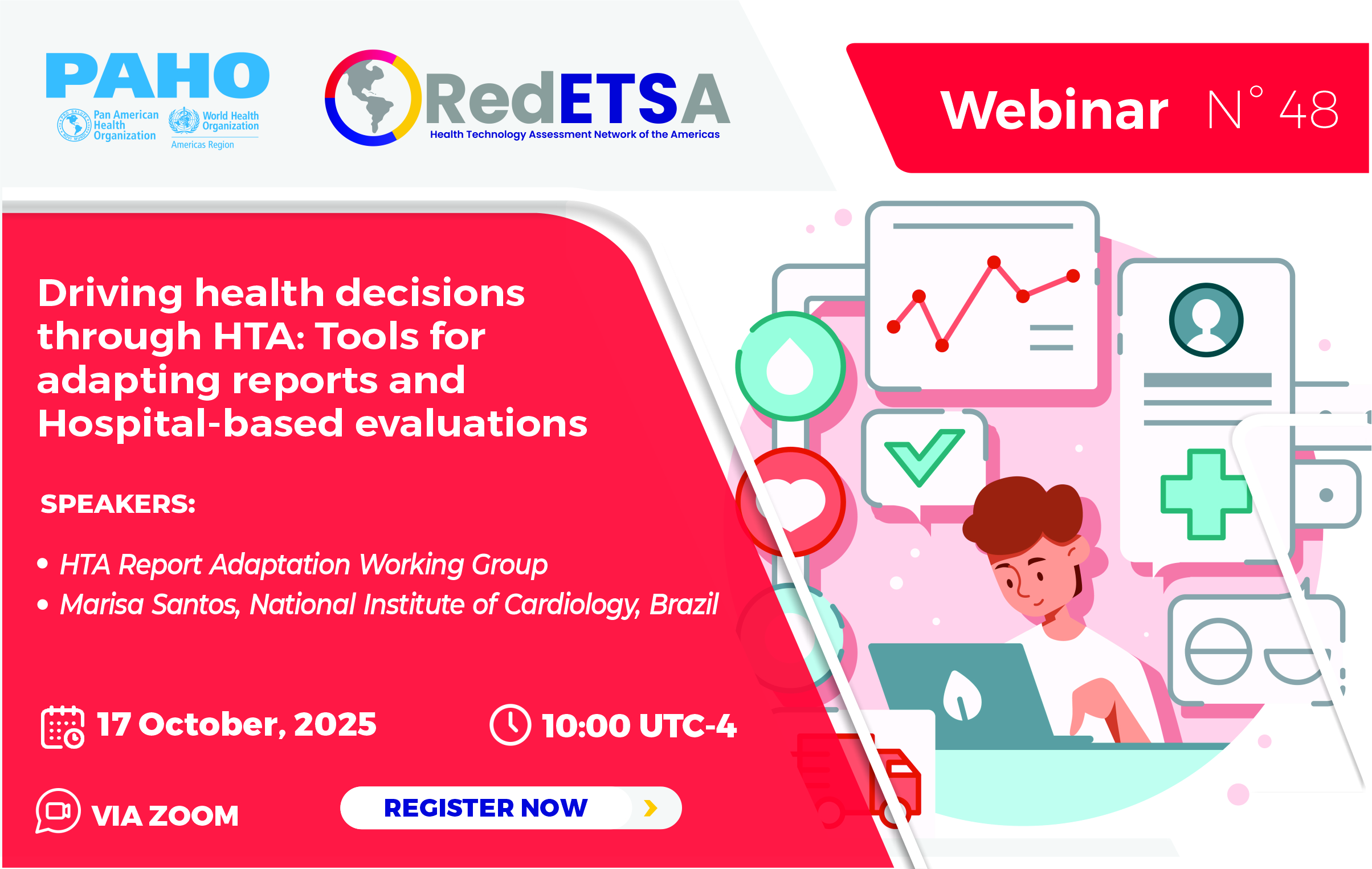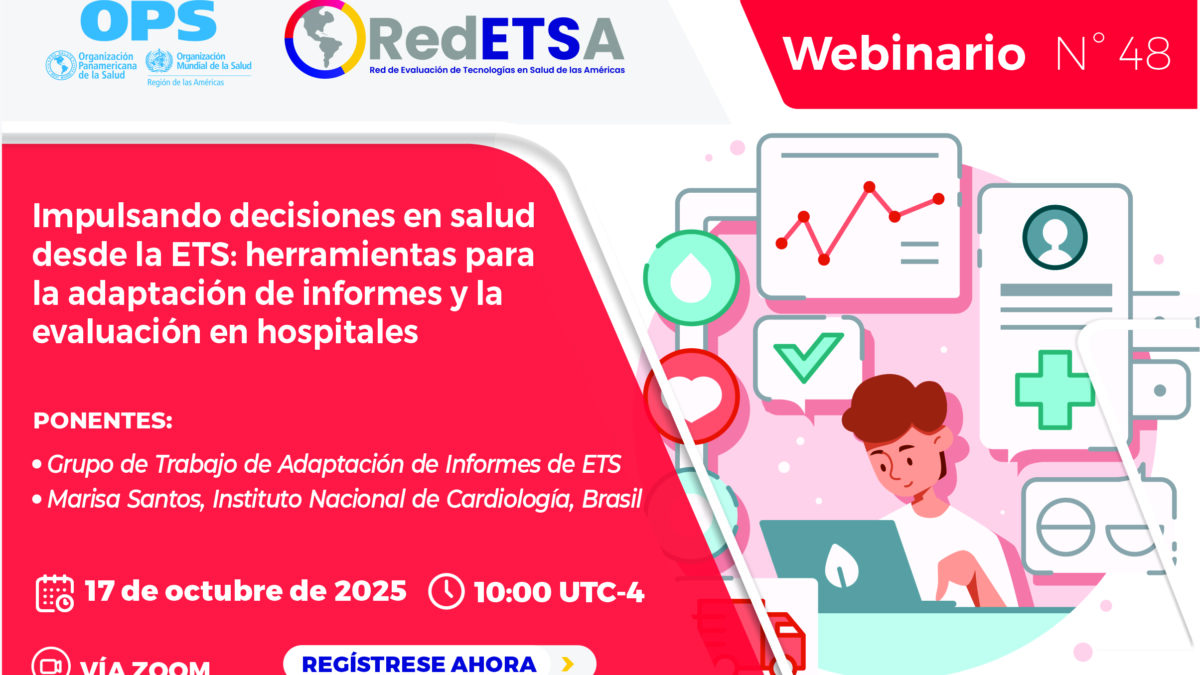
Upcoming Webinar – 47th Edition: “Dialogues on AI in ETS: Opportunities for Innovation and Collaboration”
September 2, 2025
The Pan American Health Organization and the Health Technology Assessment Network of the Americas (RedETSA) are pleased to invite you to a new edition of the RedETSA Webinar Program:
“Driving Health Decisions from the HTA: Tools for Adapting Reports and Evaluation in Hospitals”
How to participate
- DAY: Friday, October 17, 2025
- HOUR: 10:00 – 11:30 (UTC-4). For other cities, check the local time here
- LANGUAGES: Spanish and Portuguese, with simultaneous interpretation into English, Spanish and Portuguese.
Register now
Context
Health Technology Assessment (HTA) is a multidisciplinary process that uses explicit methods to determine the value of a health technology by producing information on different dimensions (clinical, ethical, economic, social, operational) at different points in its life cycle. Adopting or adapting HTA reports or studies conducted by other nationally and internationally recognized institutions is an efficient decision-making model. By adopting or adapting previously conducted assessments, duplication of efforts is avoided and the experience and knowledge accumulated by other organizations are leveraged. This allows for a faster and more efficient assessment of health technologies, which in turn streamlines health policy decision-making.
Health Technology Assessment aims to inform decisions to promote an equitable, efficient, and high-quality health system, using up-to-date methods and solid evidence. It has been used in health systems at different levels, although its greatest development has focused on informing policymaking at the macro level (at the national or state/province level). More recently, due to the availability of new technologies at the institutional level, an "organizational" perspective has emerged for the application of HTA principles and methods. Hospital-based health technology assessments (HB-HTAs) analyze whether the assessed technologies provide a benefit to the specific population served by the institution and determine the organizational impact of the investment or divestment analyzed. Local/hospital-based HTA seeks to provide hospital decision-makers with comprehensive and reliable evidence on the adoption of new health technologies in the context of health systems facing multiple challenges, such as the emergence of new innovative health technologies and limited health budgets.
About the Webinar
The webinar aims to present two documents recently published by PAHO and RedETSA:
– Tool for adapting health technology assessment reportsThe proposed document describes the report adaptation procedure, which consists of two stages: the identification of HTA reports to be adapted and the evaluation of the HTA report to be adapted. It then details the RedETSA HTA adaptation tool and its three modules: rapid screening, HTA report quality, and feasibility of adaptation to the local context. The material is completed with the development of the tool's content and a glossary of specific terms.
The development of this tool was proposed by one of the Working Groups of the Network for Health Technology Assessment of the Americas (RedETSA) on adapting health technology assessment (HTA) reports. It was developed from the tool created between 2009 and 2011 for the same purpose by the European Network for Health Technology Assessment (EUnetHTA).
Assessments provide a solid foundation of scientific evidence to inform decision-making. Adopting or adapting HTA reports or work conducted by other recognized institutions is an efficient decision-making model. By adopting or adapting previously conducted assessments, duplication of efforts is avoided and the knowledge accumulated by other organizations is leveraged. This allows for a more efficient assessment of health technologies, which in turn streamlines health policy decision-making.
– Hospital-based health technology assessment for Latin America and the Caribbean: Practical steps for hospital-based health technology assessment units: This report seeks to support institutions interested in developing local/hospital-based HTA, adapting international recommendations to the Latin American and Caribbean (LAC) context, and disseminating knowledge about hospital-based HTA. It provides an overview of the use of hospital-based HTA in the LAC region, as well as practical steps and principles for its local implementation. This document was developed based on searches for documents on hospital-based HTA in HTA agencies around the world, a scoping review of publications on the topic in the LAC region, and a survey conducted among RedETSA members.
The implementation and institutionalization of HTA in hospitals requires an organizational structure and HTA-trained personnel. Whenever possible, the creation of a dedicated local HTA unit regulated by a legal framework will strengthen and improve the decision-making process, making it more robust, transparent, and efficient.
Speakers
- Cristian Dorati, CUFAR, Argentina; and Alicia Alemán, University of the Republic, Uruguay (Working Group on Adaptation of HTA Reports of RedETSA)
- Marisa Santos, National Institute of Cardiology of Brazil
At the end of the presentations, there will be an open space dedicated to questions and comments from participants.

